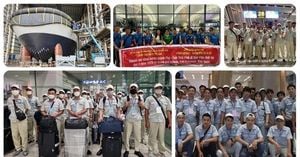Public transportation services across the Ruhr region are facing significant disruptions due to a full-day warning strike initiated by the Verdi union. The strike has led to the grounding of buses and trains, particularly affecting areas like Recklinghausen, Bochum, and Gelsenkirchen. Verdi's action aims to escalate pressure during the current salary negotiations for public service employees.
Employees from various transport companies, including the Vestische, Bochum-Gelsenkirchen City Trams (Bogestra), and the Herne-Castrop-Rauxel Tram (HCR), have been called to participate. Municipal workers from facilities across Leverkusen and Bielefeld, as well as the city of Oberhausen, are also expected to join the strike.
The Vestische company announced the complete halt of operations for 24 hours, stating this cancellation applies to all public transport services, including demand-responsive transport such as shared taxis and bus taxis. The company explicitly noted on their website, 'All trips will forfeit both the mobility guarantee and the punctuality promise.'
Verdi is demanding an eight percent wage increase, at minimum 350 euros per month, from the negotiating parties, which include both federal and municipal employers. The second round of negotiations is set to take place on February 17 and 18 in Potsdam. A Verdi spokesperson expressed the urgency of building pressure, stating, 'We want to put as much pressure as possible before the next round.' The union also noted the potential for additional strikes.
Earlier last week, similar warning strikes occurred across various cities. The challenges facing public transport are underscored by comments from union representatives being echoed by workers, highlighting the dire staffing situation. Özcan Günay, the Works Council Chairman at HCR remarked, 'The staffing situation within public service, especially among local transport companies, is dramatic. There is merely little applicant interest, and existing staff are working to their limits.' He emphasized the need for incentives to attract new candidates for these pivotal roles.
The strikes also affected the city of Castrop-Rauxel, where three out of four transport companies saw significant service reductions on Monday, February 10. Bus services across the region are minimally available, and commuter frustrations are mounting.
On the same day, February 10, all operations for HCR and Bogestra were also suspended, echoing their earlier strikes on February 6. The strike efforts signal Verdi's response to the lack of progress from the initial negotiation session, which concluded unproductively on January 24. This indicates the union's commitment to advocating for more substantial salary adjustments and improving the appeal of public service jobs.
Further corroboration of the strain on service delivery has been articulated by Patrick Steinbach, the representative spokesperson for Bogestra. He stated, 'The burden on our colleagues is intolerable. This negotiation round is not solely about wages; it’s also about relieving our employees. A possibility for converting ascertained salaries to free time would be extremely beneficial.' Such sentiments reflect the broad attention to the pressures facing employees who aim to provide reliable public transport.
Striking workers plan to gather at multiple operational centers from 8 AM to 2 PM, with talks and speeches expected as part of their protest measures. HCR employees will be assembling between 10 AM and 1 PM at their operational hub.
The next round of talks, as noted by Verdi, is scheduled for the end of February, with subsequent discussions planned for March. The gravity of the strike has raised awareness about the persistent issues within the public transportation system, which is now being pushed to secure fairer working conditions and pay during tough economic times.
For residents of the Ruhr area relying on public transport, these developments are likely to have immediate impacts on their daily commutes, with the potential for longer-lasting change contingent on the outcomes of these talks between Verdi and municipal authorities.



